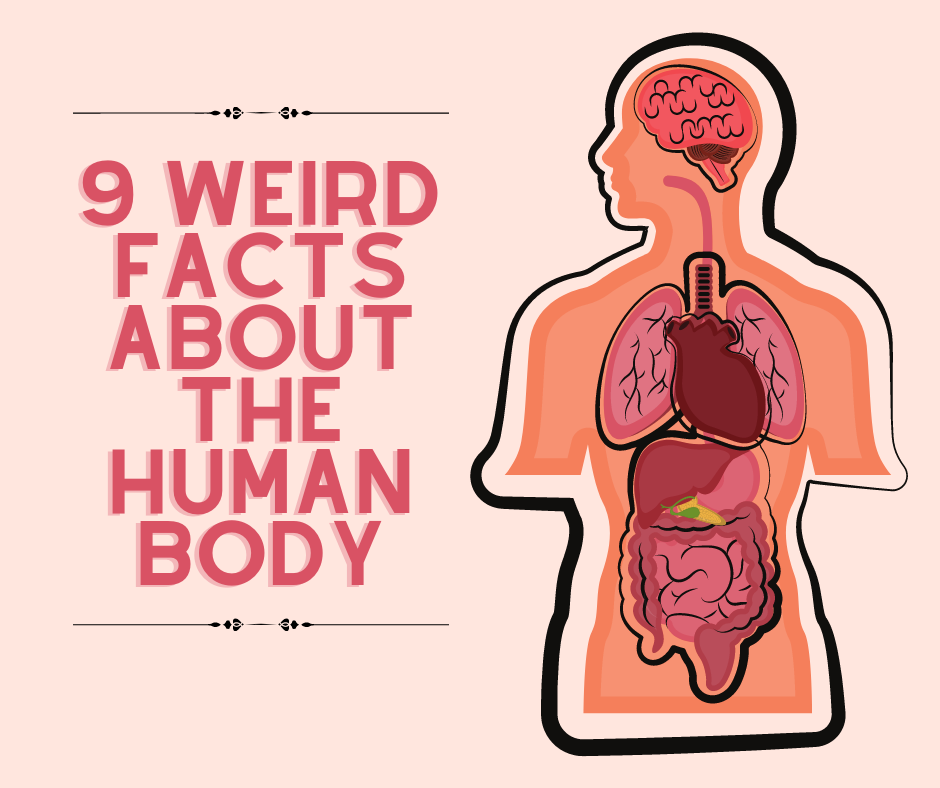

The human body is a complex and fascinating organism, and there are many interesting and unusual facts that you may not know about it. Did you know all of these fun facts about the human body? Let us know!
1. Don’t You Nose?
The human nose is incredibly sensitive and can detect over one trillion different scents. This makes it one of the most sensitive sense organs in the body. It can detect even the faintest odors and is essential for many important functions such as detecting potential dangers, finding food, and even recognizing loved ones. The nose also plays a crucial role in our sense of taste and overall quality of life.
2. So Much Saliva!
The human body can produce enough saliva in a lifetime to fill two swimming pools, and that’s facts. Saliva is a clear liquid that is produced by glands in the mouth. It plays an important role in the digestion process, as it contains enzymes that help to break down food. Saliva also helps to keep the mouth clean by neutralizing harmful bacteria, and it plays a role in our sense of taste.
3. Brain and Fat vs. Brawn?
The human brain is made up of about 60% fat, making it one of the fattiest organs in the body. This high percentage of fat is necessary for the proper functioning of the brain, as it helps to insulate and protect the nerve cells, and it also plays a role in the formation of the myelin sheath that surrounds nerve cells. Additionally, certain types of fats, such as omega-3 fatty acids, are crucial for the development and function of the brain. A diet that is lacking in healthy fats can negatively affect the brain’s function.
4. Do You ‘Ear That?
The human ear is incredibly sensitive and can detect sounds from as low as 20 Hz to as high as 20,000 Hz. This range is wider than any other mammal, allowing humans to hear a wide variety of sounds, from the faintest whispers to the loudest explosions. The ear is made up of several parts, including the outer ear, middle ear, and inner ear, each of which plays a crucial role in the process of hearing. The sensitivity of the human ear also makes it vulnerable to damage from loud noise, which is why it is important to protect your ears from excessive noise.
5. And I… Am… Iron Man
Fun facts, the human body has enough iron in it to make a nail 3 inches long. Iron is an essential mineral that is found in the human body. It is necessary for the production of hemoglobin, a protein in the red blood cells that carries oxygen throughout the body. Iron also plays a role in the immune system, as it helps white blood cells fight off infection.
However, not getting enough iron can lead to anemia, which is a condition characterized by a lack of red blood cells. Iron can be found in red meat, leafy greens, and fortified cereals, it can also be supplemented via an oral supplement, under medical supervision.
6. More Thirsty than Hungry
The human body can survive without food for about a month. However, it can survive without water for only about a week. This is because water is essential for maintaining the body’s functions, such as regulating body temperature, transporting nutrients, and eliminating waste. Meanwhile, your body always has storage of fats and carbohydrates ready to be used if, for some reason, you cannot eat regularly for a month.
7. Our Bodies are Bloody Amazing
The human body contains about 5-6 liters of blood, which is about 8% of total body weight. This blood is responsible for transporting oxygen, nutrients, and hormones throughout the body, as well as removing waste products and fighting off infection. The heart pumps blood through a network of blood vessels, including arteries, veins, and capillaries. An average adult’s heart pumps about 5 liters of blood per minute, and in a lifetime, it can pump enough blood to fill an Olympic-sized swimming pool.
8. We’re So Hot, Literally!
The human body can generate a significant amount of heat, mainly through metabolism, and physical activity. In fact, it is estimated that the human body can generate enough heat in 30 minutes to boil half a gallon of water. This heat production is necessary to maintain the body’s core temperature at a stable level. It also supports vital functions such as digestion, muscle movement, and hormone production. The body also has natural cooling mechanisms, such as sweating, to prevent overheating.
9. A New Way to Fix Clifford’s Problem?
Sulfur is a chemical element that is present in many compounds in the human body. It is a vital mineral that plays a role in the formation of collagen. This is a protein that is essential for the health of the skin, tendons, and ligaments. Sulfur is also involved in the production of insulin. This is a hormone that regulates blood sugar levels and in the detoxification of the liver. Sulfur is commonly found in foods such as eggs, garlic, onions, and cruciferous vegetables.
Fun facts, the human body has enough sulfur to kill all the fleas on an average dog. Consider that the next time your dog is caught in an itchy situation!

